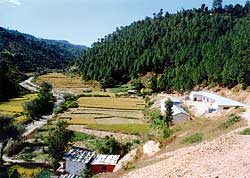 At her home, up a steep wooden staircase in Sandhikharka, Pratiba Acharya is bored. In her tiny bedroom, walls plastered with popstar posters, textbooks are piled high. Her school, Argakhanchi Higher Secondary, has been closed for nearly three months on Maoist orders.
At her home, up a steep wooden staircase in Sandhikharka, Pratiba Acharya is bored. In her tiny bedroom, walls plastered with popstar posters, textbooks are piled high. Her school, Argakhanchi Higher Secondary, has been closed for nearly three months on Maoist orders. "We'd heard the Maoists think only rich people study in English schools like mine, so they want to close them," says the shy 15-year-old in English. But, she adds, many poor people scrimp and save to send their children to the district's 17 private schools. Pratiba's family can't afford to send her away, so like many of her classmates she is idle and deeply worried about her plans to study science.
Pratiba's school is idyllically situated near pine forests at the edge of town. Principal Sri Krishna Bhushal showed us the redundant facilities. His students have now gone to local schools where there were 200 students in one class before the closure of private schools. "Now you can imagine the numbers," says Bhusal, "It's hazardous for their health."
Bitter politicised local disputes have produced tragedy here. A widely respected local Congress leader who had stood up to the Maoists, Ram Mani Gyawali, ('The murderous middle ground', Nepali Times # 86 ) was hacked to death here three years ago. "He never thought ill of anyone," recalls former VDC chairman Bhoj Bahadur Basnet. "But his gruesome death made all the political leaders run away." Five Congress members and others have met similar deaths.
Bhoj Bahadur now lives in Kathmandu and on one of his rare day-trips to his village, I could sense his family's unease as strangers arrived. A hunted look on his face, he told me he would be away by nightfall.
In the same village, Tilottama Bhushal is being comforted by her youngest son. Every so often, she breaks down as she tells of how one son, Lekhnath, died in a road accident while working as a driver. Her eldest son, Dharma Raj, blamed local Congress politicians for having blocked Lekhnath's appointment as a teacher and joined the Maoists. After that, Tilottama says the army started victimising her daughter, Kanchi.
 "One day they came and took her away," she told us. They kept her for 49 days and beat her with sticks. On returning home, she had jaundice but was ordered to report to the army in Sandhikharka every three days. Kanchi couldn't take it any more and joined the Maoists. Recently, Kanchi who her mother insists never wielded a gun, died at the hands of the army. As for Dharma Raj, the family barely hears from him.
"One day they came and took her away," she told us. They kept her for 49 days and beat her with sticks. On returning home, she had jaundice but was ordered to report to the army in Sandhikharka every three days. Kanchi couldn't take it any more and joined the Maoists. Recently, Kanchi who her mother insists never wielded a gun, died at the hands of the army. As for Dharma Raj, the family barely hears from him. Travelling deep into the breathtaking Argakhanchi countryside, a visitor might be oblivious to the conflict. Every so often Dhaulagiri appears from behind the jagged green foreground with its immaculately tended fields and terraces. In Ghorakhori, the Maoists passed through the day before we arrived. Dhan Bahadur Khatri Chhetri, a venerable family patriarch, chuckles as he pours a tot of rum for breakfast. "They demonstrated their arms and ammunition to us," he says. "They stayed a night then went down into the valley. They say they're fighting for us and we must help and then they go on." So far, a plan to conscript one person from each house has been threatened but not implemented.
Deep down in the valley below, a huge network of mustard fields nestles by the fast-flowing Jhimruk Khola, hidden from the world outside. The footbridge here is one of the very few links to the Maoist Midwestern heartland of Pyuthan. Most houses lie empty, only 20 families live permanently in this fertile but remote spot. Purna Ram Belbase keeps a small shop. "If I don't sell the Maoists something, I'll put myself in danger," he says. "But if I do and the army finds out, then I'm in danger too."
The army says it has been mounting a major operation against the Maoists in Argakhanchi and three neighbouring districts. It is difficult to test this claim. Villagers like Purna Ram have seen nothing but the Maoists did cancel a planned meeting partly on grounds of ultra-caution because of the army offensive.
rtion and related violence remain common. Since a major Maoist assault on Sandhikharka two years ago (see: 'Enough', Nepali Times #111 ) the army has increased its strength here to 700 troops and has also moved its barracks to a more secure spot up the hill from town.
"The army hasn't made us feel secure," said a man from the town. "They roam around during the day, but after sundown there's no one here."


